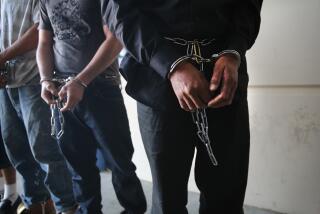Bush to Unveil Expanded Enterprise Zone Proposal : Cities: The new urban aid plan will first be discussed during a meeting today with California officials.
- Share via
WASHINGTON — President Bush, hoping to boost Democratic support for his urban aid plan, will outline a greatly expanded enterprise zone proposal when he meets today with California officials and senior members of Congress, White House aides said Monday.
The enterprise zone concept, once pushed by President Ronald Reagan with little success, has emerged as a centerpiece in the Bush Administration’s response to the riots in Los Angeles.
Bush summoned congressional leaders from both parties, along with Rep. Dan Rostenkowski (D-Ill.), chairman of the House Ways and Means Committee, and Sen. Lloyd Bentsen (D-Tex.), chairman of the Senate Finance Committee, to the White House this morning.
They will meet with Los Angeles Mayor Tom Bradley, California Gov. Pete Wilson, and Peter V. Ueberroth, head of the Rebuild L.A. project, for the unveiling of what one White House official characterized as a “much deeper and broader” enterprise zone plan.
The official, speaking on condition of anonymity, portrayed the session as one in which the California officials, legislative leaders and Bush could “get down to the nitty-gritty” in their efforts to hammer out a detailed plan that could win approval in Congress.
The original enterprise zone plan would have created 10 such areas around the country, granting tax advantages to firms that established operations in those areas.
The new proposal would broaden those benefits and--in an effort aimed at gaining Democratic support--include a refundable earned income tax credit for people who leave the unemployment rolls to take new jobs in the zones.
The earned income credit would be aimed at lowering the new workers’ overall tax payments so that they would not receive less money from a paycheck than from public assistance.
Today’s meeting stems from a session last Friday in Los Angeles that included Bush, Bradley, Wilson, Ueberroth and federal officials dispatched to the city in the wake of the riots.
At that meeting, Bush has said, he was encouraged to press ahead with the larger enterprise zone plan. Participants saw such zones as one of the best ways to spur investment in communities desperate for jobs but unappealing to likely investors.
In an interview Saturday with senior executives of Times Mirror Co. and the Los Angeles Times, Bush said the direct message he received from the Californians was that “enterprise zones are what we need.”
The President said Ueberroth told him “he needs that to get the private businesses in there.”
In addition to proposing the earned income tax credit, White House officials said, Bush also will suggest allowing participating businesses to write off more capital expenses in the first year, rather than having to spread so much of the write-offs over several years--an element that has been proposed by some Democrats.
One figure proposed for the first-year write-off--but not decided upon--would be $50,000.
Details of the proposal were hammered out Monday in a meeting that included White House Chief of Staff Samuel K. Skinner, Housing and Urban Development Secretary Jack Kemp and Nicholas E. Calio, Bush’s assistant for legislative affairs. The specifics had not been presented in final form to senior members of Congress, one White House official said Monday night, so congressional reaction could not be gauged.
The official also said the plan is considered open to debate and modification, beginning with today’s meeting and could be revised depending on the response of congressional leaders and the California officials.
“All the proposals are in a working stage,” one White House official said.
“It is what Wilson and Ueberroth wanted to have--the opportunity to have an open discussion with the Democrats,” the official said.
In a sign that the plan was becoming broader in reach than originally envisioned, Bush was said to have accepted the idea that other cities across the nation--besides the 10 selected for the original zones--could participate. To qualify, they would have to meet certain criteria.
Among those criteria would be high levels of urban blight, crime and unemployment.
Such an expansion could broaden support beyond the Democrats in Congress to urban mayors, many of whom are Democrats who could be counted on to lobby their representatives in Congress to act quickly on the proposal.
But it also could raise objections among Republicans and others concerned that it would lock into the budget a still uncalculated expense at a time when the government is looking for ways to reduce spending.
More to Read
Get the L.A. Times Politics newsletter
Deeply reported insights into legislation, politics and policy from Sacramento, Washington and beyond. In your inbox twice per week.
You may occasionally receive promotional content from the Los Angeles Times.










